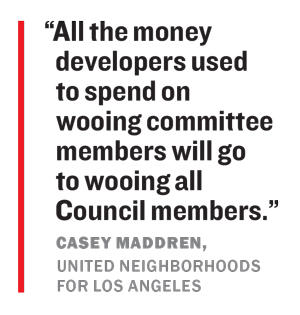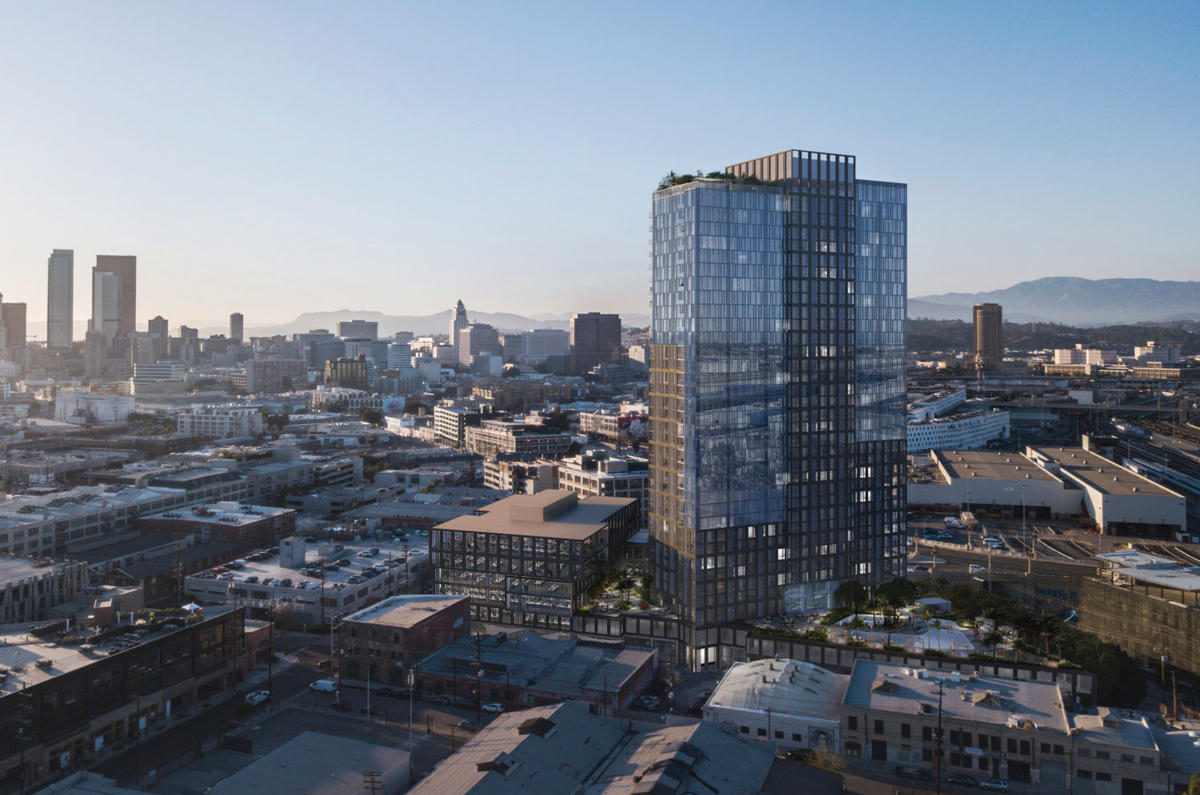The FBI brought down the hammer last year on Jose Huizar’s alleged criminal enterprise, stating that the former Los Angeles City Council member milked developers for more than $1 million in payments and gifts, ranging from prostitutes to money to settle sexual harassment lawsuits.
In exchange, according to investigators, Huizar greased the wheels for their controversial projects — Shenzhen New World Group’s 77-story tower and Carmel Partners’ 35-story residential building in the Arts District.
As Huizar’s alleged misdeeds incited anger and embarrassment at City Hall — Mayor Eric Garcetti said he was “sickened” by the indictments — City Council member David Ryu made a modest suggestion: create an office of the inspector general to snuff out future real estate crimes.
Ryu’s proposal seemed like the least the city could do. An “IG” is a garden-variety post in most city governments. Ryu noted that even cities with less than pristine records, such as Philadelphia and Chicago, employ an independent investigator to root out corruption, fraud and misconduct.
“Pay-to-play politics is made possible when politics is exploited for personal or financial gain,” Ryu wrote in a proposed ordinance. “In Los Angeles, that power rests predominantly in land use.”
But the ordinance’s fine print did not actually call for an inspector general.
Instead, it merely requested “studying the feasibility” of having one, with no deadline for such an analysis. And now such a report might be asking too much: Ryu was voted out of office in November.
The stalled proposal is indicative of a choice made by those in charge at City Hall. Despite the allegations against Huizar (who pleaded not guilty and faces a criminal trial in June), the city will likely punt on reforming real estate project approvals.
“There’s no momentum for change,” said Ryan Leaderman, a land use attorney at Holland & Knight.
That may be because officials, namely the 15 City Council members, benefit from a convoluted status quo.
“There’s a lot of institutional inertia,” Leaderman said. “People generally don’t want to give up power.”
How soon they forget
Ideas to revise the development approval process, whether sweeping or specific (City Attorney Mike Feuer called for revoking project approvals tainted by the Huizar probe), languish in Council committees.
 “The recent scandal has prompted the City Council to introduce a flurry of new initiatives,” Nithya Raman, who was later elected to take over Ryu’s Council seat, noted in August following Huizar’s arrest.
“The recent scandal has prompted the City Council to introduce a flurry of new initiatives,” Nithya Raman, who was later elected to take over Ryu’s Council seat, noted in August following Huizar’s arrest.
But, Raman added, “It’s hard to know how far any of these motions will get, given that most such efforts are quickly forgotten.”
Rhetorically, at least, city leaders have called for reforms.
Garcetti said during a December press conference that he agreed with outgoing U.S. Attorney for Los Angeles, Nicola Hanna, that the arrest of Huizar “should prompt a serious discussion as to whether reforms are warranted in Los Angeles city government.”
Garcetti said he wants Council members to not vote on real estate projects if they took money from the developer, stating a recusal policy would “take away the temptation” of pay-to-play politics. The mayor also said he would like “charter reform,” a reference to a municipal governance charter last updated in 1999, when Cher’s “Believe” led the Billboard 100.
But such bills require approval by the same Council members they would police, and neither idea has gained traction.
The Council in December 2019 did approve a ban on members taking direct contributions from developers. But the measure said nothing about indirect payments by developers to political action committees benefiting lawmakers (or, in the case of Huizar, through his former high school, where Greenland USA and Related Companies provided contributions).
Council members panned the developer donation ban, with Mike Bonin savaging it as “piecemeal crap.” Yet no stronger legislation, or any bill for that matter, has advanced to further restrict what developers can give.
Ryu and Council member Paul Koretz authored an ordinance to remove a clause in the 1999 charter that gives the City Council the same power as the mayor-appointed Planning Commission over new developments.
The measure could curb Council members’ decision-making powers that are ripe for abuse, said Sean McMorris, a consultant at Southern California Common Cause. But the legislation “has sat idle in the City Council Rules Committee,” McMorris noted.
Like Garcetti, City Council President Nury Martinez has said the approval process needs to change.
Martinez introduced an ordinance to steer “high-value projects” (which she defined as multimillion-dollar proposals) around the Council’s Planning and Land Use and Management Committee and straight to the full Council.
The measure is a rebuke to Huizar, who chaired that committee. Martinez, though, may be suggesting a game of Whac-A-Mole.
“In reality, all the money developers used to spend on wooing committee members will go to wooing all Council members,” said Casey Maddren, president of United Neighborhoods for Los Angeles, an advocacy group for affordable housing.
Kings of their districts
In not more aggressively pursuing reform, Garcetti and Martinez offer a partial excuse: The problem was less the approval process than Huizar himself.
The scandal was marked by “illegal bribes,” Garcetti said at the press conference, adding, “It’s tough to outlaw something that is already outlawed.”
In an email to TRD, Martinez said that “the one thing that we cannot legislate is personal accountability and moral fortitude. That is the duty of each individual official — to be a good and faithful servant.”
Indeed, as someone who allegedly made subordinates call him “boss” and shook down developer Shenzhen Hazens for three Katy Perry concert tickets, Huizar may be a “singular” figure in the annals of city politics, said Andrew Brady, a land use attorney at DLA Piper.

A rendering of the 35-story project that a Los Angeles City Council member allegedly approved in exchange for bribes. The approval has not been revoked.
But, Brady added, Huizar’s actions were made possible by an approval process dependent on the case-by-case decisions of Council members.
“The corruption comes from discretion,” Brady said. “When there’s discretion to deny a project, some unscrupulous character may take advantage of the process.”
The discretion starts with a zoning code that even the City Planning Department admits is a reaction to specific project proposals.
“The current zoning code is the result of decades of amendments and supplemental layers of land use regulations that were added on top of the existing regulations to achieve specific goals,” reads a post on the department’s website, which also notes that 66 percent of all L.A. lots are spot-zoned.
The city’s convoluted project approval process requires four sign-offs: from a city planning official, the mayor-appointed Planning Commission, the City Council’s planning committee and finally the full City Council — with the member who has project jurisdiction instructing colleagues how to vote.
City Hall observers could not recall a single time when a Council member’s prerogative over land use matters was challenged by a colleague.
“The Council members like being little kings of their district,” Leaderman said.
The process can be sidetracked by neighbors, labor unions and others who invoke laws such as the California Environmental Quality Act to trigger appeals. Attorneys for developers complain that appeals tend to make people lose sight of a project’s merits.
“At review hearings, the cranky old man who doesn’t like traffic is at the same level as the engineer who has actually studied the neighborhood’s traffic,” said Ellia Thompson, a land use attorney at Ervin Cohen & Jessup.
But ultimately these appeals, Thompson said, are simply further invitations for Council members to wield their clout and make a deal with opponents. Appeals also lead developers to conclude that because even sane projects get derailed, why not propose something wild?
For instance, an executive from Carmel Partners (now CP Employers) allegedly felt internal pressure to get a residential high-rise in the Arts District approved.
The executive purportedly found that if he bribed Huizar (mostly through contributions to a PAC created to elect Huizar’s wife to the City Council), Carmel could get its 35-story tower built on a street where the next-tallest building was four stories.
Huizar shuttled the project through the planning committee and full City Council, which unanimously approved it despite furious neighbor and labor union opposition. The Carmel executive allegedly bragged to colleagues that the approval was “truly amazing.”
Pandemic gets dibs
Garcetti answered the question about Huizar during a press conference where he broadcast the city’s skyrocketing Covid death toll.
The mayor, in other words, has a lot to deal with. And even if Garcetti were examining the city’s real estate approval process, his action might not be readily apparent.
“Since Covid in March, everyone has been so isolated and contained [that] I’m not aware of any deep thoughts or conversations around reform,” Thompson said.
Garcetti’s critics, for their part, accuse him of having one foot out the door. In 2018, the mayor traveled across the country to test-drive a presidential bid. And Garcetti surprised some observers in December when he announced that he wouldn’t join Joe Biden’s administration.
Martinez, meanwhile, has been Council president for one year and represents a working-class district of the San Fernando Valley “where you are lucky to have big development projects,” Leaderman said.
Observers do not see her confronting developers or her colleagues, nor do they see leadership from Marqueece Harris-Dawson, who replaced Huizar as planning committee chair.
“I don’t know if he has the wherewithal to really push through structural reforms,” Leaderman said of Harris-Dawson. “I’m not seeing games being played. I just don’t think there’s a push to get things done.”
Emails, calls and tweets over three weeks to Harris-Dawson’s office went unanswered. The Council member’s failure to respond was not unique. Some members, who represent about 600,000 constituents each, do not even have websites (incoming member Mark Ridley-Thomas, for one) or post nonworking phone numbers on their sites (Koretz).
Maddren, the affordable housing advocate, hopes that Ryu’s replacement, Raman, will be a voice for reform. Raman declined an interview request, with a spokesperson saying, “All of Council member Raman’s attention is focused on setting up her office and attending to the pandemic and its associated economic fallout.”
During the pandemic, the work of Council members and their interactions with developers have moved even further from public view. McMorris of Common Cause noted that post-Huizar, there could have been a push for city government transparency.
But the response from the mayor and City Council, he said, “is severely lacking.
